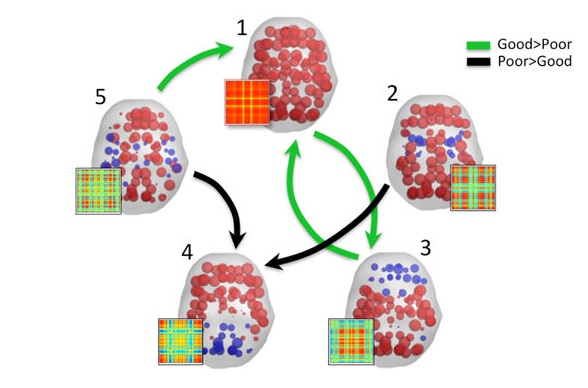The brain’s performance during old age is determined by factors such as education or socio-economic level
The brain’s performance during old age is determined by factors such as education or socio-economic level
An international team of researchers involving Gustavo Deco, head of the Computational Neuroscience Research Group, has found that certain patterns of brain activity are associated with better cognitive performance. The research is published this month in the journal Scientific Reports.
 The archetype of the ancient sages, renowned for their knowledge and good judgement, continues to inspire dreams of reaching a bright and illustrious old age. But it is not clear how those elders were able to stop the natural cognitive deterioration associated with ageing.
The archetype of the ancient sages, renowned for their knowledge and good judgement, continues to inspire dreams of reaching a bright and illustrious old age. But it is not clear how those elders were able to stop the natural cognitive deterioration associated with ageing.
A team of international researchers has recorded and analysed the brain activity of 98 healthy Portuguese adults with different levels of cognitive skills and has found patterns of brain activity associated with better cognitive performance. The research published in the journal Scientific Reports led by the University of Oxford, has involved Gustavo Deco, ICREA researcher and head of the Computational Neuroscience Research Group of the Department of Information and Communication Technologies (DTIC) at UPF.
The results show that the participants with better cognitive performance have different brain activity, even when quietly resting inside the MRI scanner. The team has developed a new method to characterize the evolution of the functioning of the brain’s functional connectome over time. Through Leading Eigenvector Dynamics Analysis (LEiDA), recurring patterns of the brain’s network activity can be detected in large datasets.
Joana Cabral, a researcher at the University of Oxford and first author of the study, explains that “by using this new method we can efficiently characterize the repertoire of the network states that the human brain wanders through during rest” and adds that “for the first time we have been able to demonstrate that cognitive performance in adult life is related to the dynamic landscape of the states of the brain network, which is shaped during life by factors such as education, socio-economic status, or even depending on mood”.
 The functional connectome of the participants in the study who obtained the worst results changed more erratically between different configurations of neural networks. However, those who obtained good results were able to form and maintain specific connectivity patterns over a longer period of time and also adapt to more reconfigurations of structured networks.
The functional connectome of the participants in the study who obtained the worst results changed more erratically between different configurations of neural networks. However, those who obtained good results were able to form and maintain specific connectivity patterns over a longer period of time and also adapt to more reconfigurations of structured networks.
These results provide new evidence that link the changing dynamics of the functional connectome with cognitive performance in old age, and reinforce the functional role of the brain’s spontaneous activity for efficient cognitive processing.
According to Oxford professor Morten Kringelbach, “this helps to understand the dynamics of the healthy ageing of the brain. In the long term, we hope to characterize the evolution of these changes during the life of the same individuals, with the aim of identifying in advance those who need help”.
In the words of Gustavo Deco of UPF, “the computational models of the brain with which we are working can provide an explanation as to the origin of the functionality of the human brain and, consequently, explain its decay or simply his ageing”.
At a time when modern medicine is increasing life expectancy to our bodies’ limits, one of the main challenges for neuroscience is to understand the root of cognitive decline and, somehow, to help dissociate it from the natural ageing process.
Reference work:
Joana Cabral et al. Cognitive performance in healthy older adults relates to spontaneous switching between states of functional connectivity during rest. Scientific Reports. July 2017 DOI:10.1038/s41598-017-05425-7
